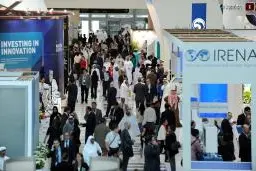PHOTO
Nation Plans 175 GW Extra Capacity by 2022 - Solar, Wind, Small Hydro, and Bioenergy to Supply 40% of Electricity by 2030;
Technology and Finance in Spotlight at WFES 'Focus on India' Sessions;
Abu Dhabi, United Arab Emirates - India’s solar power industry will showcase an unprecedented range of investment opportunities at the World Future Energy Summit (WFES) 2017 in Abu Dhabi, after the Indian government recently outlined plans to add an additional 175 GW of renewable energy to the nation’s electricity supply by 2022.
The Indian Ministry of New and Renewable Energy (MNRE) is targeting 100 GW of solar power, including utility-scale and rooftop solar. The remaining capacity will include 60 GW of utility-scale wind energy, 5 GW of small hydro, and 10 GW of bioenergy.
Indian solar developers will bring bankable, investment-ready projects to WFES 2017, offering solid, ready-to-sign opportunities for finance, technology and services.
''The commendable initiative taken by the Honourable Prime Minister of India, Shri Narendra Modi, in setting up The International Solar Alliance demonstrates the resolve of India to become a leader of solar energy production in countries situated between the Tropic of Cancer and the Tropic of Capricorn,'' said Shekhar Dutt, Director General of the Indian Solar Power Developers’ Association.
“These plans are very ambitious and there will be a significant need for international investment and technology. The timescale creates a considerable urgency in sourcing suppliers and partners, and government policies are very supportive of foreign investment in new projects.”
In 2015 the installed capacity of renewables in India was around 37.4 GW, or about 14 per cent of the total. Government planners aim to raise this to 40 per cent of the total electricity supply by 2030, reducing the emissions intensity of GDP by up to 35 per cent from 2005 levels.
The transformation is backed by pro-business policies, which include allowing 100 per cent foreign ownership and repatriation of after-tax profits, tax exemption for up to 10 years, and duty-free imports of technology. International development banks and local banks give substantial support to private-sector renewable energy projects.
Hosted by Abu Dhabi’s renewable energy company, Masdar, as part of Abu Dhabi Sustainability Week, WFES aims to drive the business of clean energy, particularly across the Middle East, North Africa and South Asia.
The exhibition and conference brings together the world’s leading renewable energy professionals, policy makers, innovators and investors. The 2016 edition hosted 30,000 attendees from 150 countries, and 600 exhibiting companies. WFES Solar Expo, one of five co-located shows within the event, showcases the latest in solar technology. In 2017 this will include a dedicated India Pavilion.
“Renewables have clear economic advantages compared with more established technologies, such as coal-fired or nuclear power stations, apart from the environmental benefits,” said Mr. Sundeep Gupta, Vice Chairman and Managing Director of Jakson Engineers Limited India, which will be exhibiting at WFES 2017. Jakson Engineers Limited has executed many large engineering, procurement, construction (EPC) contracts, set up independent power producers (IPCs), and has provided technical and financial assessments on several projects across the country.
“Increasingly, renewables are the more cost-effective option, and can easily be scaled up in stages to meet rising demand. Rooftop solar panels and smaller installations can be located close to the end-user, reducing the need to invest in transmission networks, and they don’t require imported coal or gas at unpredictable prices.”
India currently has around 275 GW of installed electricity capacity, significantly higher than its estimated 140 GW of peak demand, yet some parts of the country face acute power shortages due to coal supply problems, high levels of transmission and distribution losses, and financial problems at local utility companies.
Many customers resort to private, local, costly and dirty solutions, such as diesel generators, with both health and environmental impacts. Between 300 and 400 million Indians currently lack access to electricity, with Indian prime minister Narendra Modi pledging to bring electricity to 18,000 villages that lack a connection to the power supply by 2019.
-Ends-
About Masdar
Masdar is Abu Dhabi’s renewable energy company advancing the development, commercialisation and deployment of clean energy technologies and solutions. The company serves as a link between today’s fossil fuel economy and the energy economy of the future. Backed by the Mubadala Development Company PJSC, the strategic investment company of the government of Abu Dhabi, Masdar is dedicated to the Emirate’s long-term vision for the future of energy.
For more information about Masdar, please visit: www.masdar.ae. Stay connected: facebook.com/masdar.ae and twitter.com/masdar
About World Future Energy Summit
The World Future Energy Summit (WFES) is the world’s most influential event dedicated to advancing future energy, energy efficiency, and clean technology. Held each year at the Abu Dhabi National Exhibition Centre, WFES is hosted by Masdar Institute. The WFES 2016 exhibition and conference saw 650 companies from 40 countries, and more than 32,000 attendees from 170 countries participate. For more information, please visit www.worldfutureenergysummit.com.
About Abu Dhabi Sustainability Week 2017
Abu Dhabi Sustainability Week (ADSW) is the ground-breaking global forum that unites thought leaders, policy makers and investors to address the challenges of renewable energy and sustainable development. With the global population set to reach nine billion by 2050, ADSW promotes collaborative thinking and development to accelerate the sustainable solutions needed to support rapid economic and population growth. An Abu Dhabi government initiative, ADSW is the largest gathering on sustainability in the Middle East and a significant forum in stimulating international dialogue and action. For more information, visit www.abudhabisustainabilityweek.com.
© Press Release 2016




















